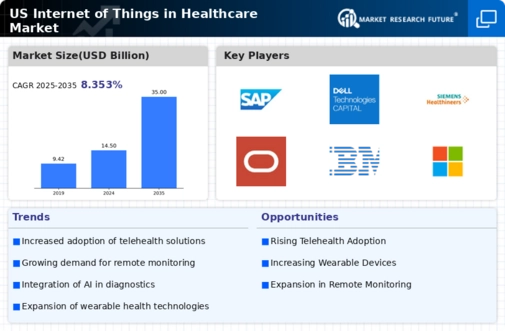Growing Focus on Personalized Medicine
The internet of-things-in-healthcare market is witnessing a growing focus on personalized medicine, which tailors treatment plans to individual patient needs. This approach is facilitated by IoT devices that collect and analyze patient data, enabling healthcare providers to make informed decisions. The demand for personalized medicine is expected to drive the market, as it has been shown to improve treatment efficacy and patient satisfaction. In fact, studies indicate that personalized treatment plans can lead to a 30% increase in patient adherence to prescribed therapies. As healthcare systems prioritize individualized care, the internet of-things-in-healthcare market is poised for significant growth.
Integration of Artificial Intelligence
The integration of artificial intelligence (AI) into the internet of-things-in-healthcare market is transforming the landscape of patient care. AI algorithms can analyze vast amounts of data generated by IoT devices, providing actionable insights for healthcare professionals. This capability is particularly valuable in predictive analytics, where AI can identify potential health risks before they escalate. The market for AI in healthcare is projected to reach $36.1 billion by 2025, indicating a robust growth trajectory. As healthcare providers increasingly adopt AI-driven solutions, the internet of-things-in-healthcare market is likely to expand, enhancing operational efficiency and patient care quality.
Regulatory Support for IoT Innovations
Regulatory support for IoT innovations is playing a crucial role in the growth of the internet of-things-in-healthcare market. Government initiatives aimed at promoting digital health technologies are fostering an environment conducive to innovation. For instance, the FDA has established guidelines for the approval of digital health devices, streamlining the process for bringing new IoT solutions to market. This regulatory framework not only encourages investment in IoT technologies but also enhances consumer confidence in their safety and efficacy. As regulatory bodies continue to support the integration of IoT in healthcare, the internet of-things-in-healthcare market is expected to flourish.
Advancements in Telehealth Technologies
Advancements in telehealth technologies are significantly impacting the internet of-things-in-healthcare market. The proliferation of high-speed internet and mobile connectivity has enabled healthcare providers to offer remote consultations and services. This shift is particularly beneficial for patients in rural areas, where access to healthcare facilities may be limited. The telehealth market is projected to reach $459.8 billion by 2026, reflecting a growing acceptance of virtual healthcare solutions. As telehealth becomes more integrated with IoT devices, the internet of-things-in-healthcare market is likely to expand, providing patients with more convenient and accessible healthcare options.
Rising Demand for Remote Patient Monitoring
The internet of-things-in-healthcare market is experiencing a notable surge in demand for remote patient monitoring solutions. This trend is driven by the increasing prevalence of chronic diseases, which necessitate continuous health monitoring. According to recent data, approximately 60% of adults in the US have at least one chronic condition, leading to a heightened need for effective management strategies. Remote monitoring devices enable healthcare providers to track patients' vital signs in real-time, facilitating timely interventions. This shift towards proactive healthcare management is likely to enhance patient outcomes and reduce hospital readmissions, thereby driving growth in the internet of-things-in-healthcare market.





















Leave a Comment